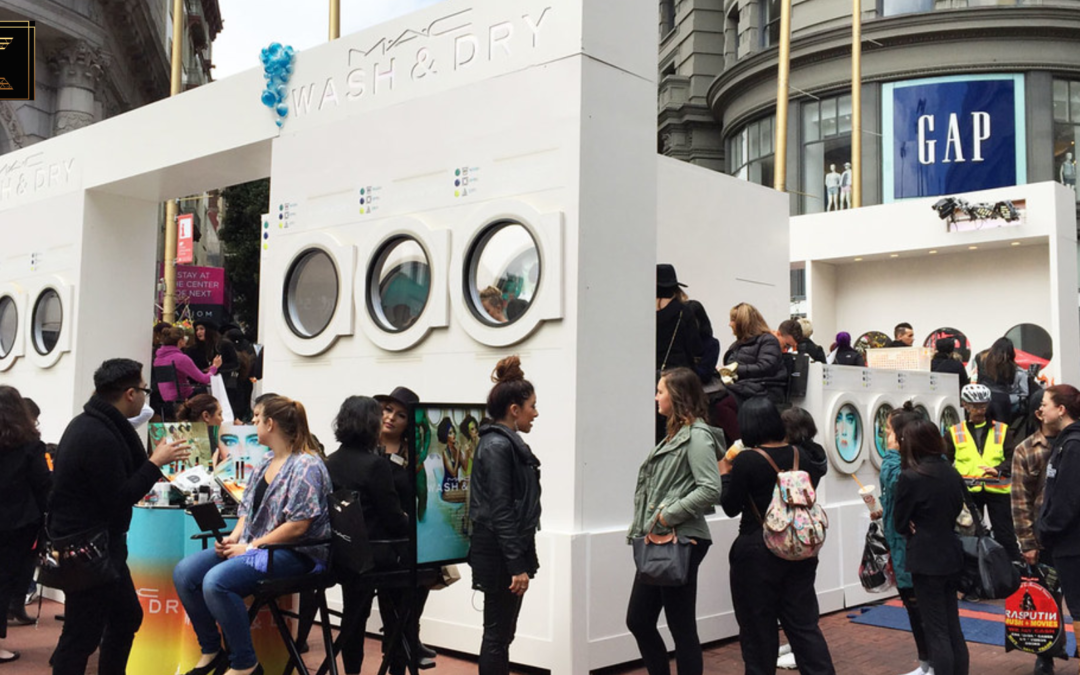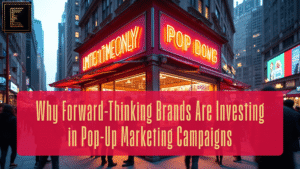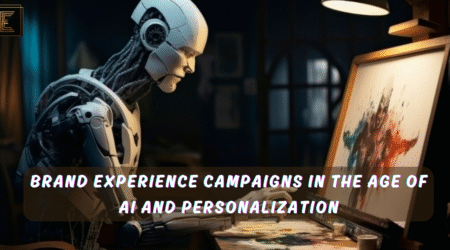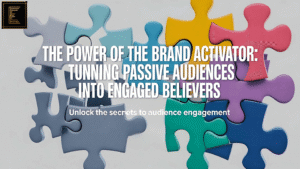Instead of only promoting their products, businesses must create memorable experiences in today’s digital-first world when customers are inundated with advertisements. Experiential marketing is useful in situations like these.
Brands like Nike, Apple, and Gucci have mastered experiential marketing to build strong emotional connections with their customers. Instead of relying on traditional advertising, they engage audiences through interactive experiences, fostering loyalty and increasing brand advocacy.
But why do luxury brands increasingly use experiential marketing events? This blog will explore how these global giants create immersive brand experiences that captivate customers and drive sales.
What is Experiential Marketing?
Experiential marketing builds strong relationships between customers and brands. Also known as engagement marketing, it is a strategy where brands interact with consumers through real-life or digital experiences rather than traditional ads.
Key Features of Experiential Marketing
| Feature | Explanation |
| Emotional Connection | Builds strong relationships between customers and brands. |
| Immersion | Involves customers in brand storytelling and product experiences. |
| Memorability | Leaves a lasting impression, making the brand more recognizable. |
| Social Sharing | Encourages user-generated content and word-of-mouth marketing. |
Why Experiential Marketing Works
- Engages customers emotionally, making them feel valued.
- Encourages participation, rather than passive ad consumption.
- Drives word-of-mouth marketing, increasing organic brand reach.
- Enhances customer retention, leading to long-term brand loyalty.
These benefits are evident in several experiential marketing case studies showing significant brand impact from global brands.
Four Benefits Of Experience Marketing
Big brands invest in experiential marketing because it:
- Strengthens brand loyalty through personalized experiences.
- Increases engagement by making customers active participants.
- Generates organic buzz through social media sharing.
- Encourages repeat purchases by forming emotional connections.
Let’s break down how Nike, Apple, and Gucci execute innovative experiential marketing techniques adopted by leading brands.
Nike’s Experiential Marketing Strategies
Nike is more than a sportswear brand—it’s a lifestyle movement. Nike experiential marketing revolves around community-building, digital innovation, and immersive retail experiences.
1. Nike Run Club – A Global Community
- Nike offers free running events and virtual challenges to engage athletes.
- The Nike Run Club app provides personalized coaching and progress tracking.
- Customers feel part of an exclusive fitness community, strengthening brand loyalty.
This is one of the most successful Nike experiential marketing campaigns to date.
2. Interactive Retail Stores
Nike stores are designed to be immersive and interactive, offering:
- Sneaker customization stations for a personalized experience.
- Sports zones where customers can test shoes before buying.
- Augmented reality (AR) displays showcasing new collections.
3. Nike House of Innovation
Nike’s flagship stores in New York, Paris, and Shanghai blend technology and experience:
- Smart fitting rooms provide personalized product recommendations.
- Nike app integration allows seamless digital and in-store shopping.
- Live product demos enhance customer engagement.
Nike experiential marketing turns shopping into an event, making customers excited to visit stores. These Nike experiential marketing campaigns are clear examples of how brand engagement translates into loyalty.
Apple’s Experiential Marketing Strategies
Apple experiential marketing thrives on creating seamless, hands-on customer experiences that foster deep brand loyalty.
1. Apple Store – A Hands-On Experience
- Customers can touch, test, and explore products before buying.
- Apple’s Genius Bar offers expert guidance and personalized support.
- The store layout encourages interaction rather than passive shopping.
2. “Today at Apple” Free Workshops
Apple’s in-store workshops teach customers:
- Photography and videography techniques using iPhones.
- Music production skills with GarageBand and Logic Pro.
- App development basics, enhancing engagement with Apple’s ecosystem.
These workshops are a part of Apple experiential marketing, positioning Apple as an educator, not just a retailer.
3. Exclusive Product Launch Events
Apple’s launch events are global spectacles:
- Millions tune in to watch keynote speeches live.
- Customers line up overnight to be the first to own new products.
- The excitement turns Apple devices into status symbols.
Apple experiential marketing blends emotion, exclusivity, and hands-on interaction, keeping customers actively engaged with the brand.
Gucci’s Experiential Marketing Strategies
Gucci takes luxury fashion marketing to the next level with immersive experiences and digital innovation.
1. Gucci Garden – A Fashion Wonderland
- Located in Florence, Italy, Gucci Garden is a mix of museum, boutique, and art space.
- Visitors experience Gucci’s history through interactive exhibits.
- The space includes a Gucci-themed cafe and a limited-edition boutique.
This immersive destination attracts fashion lovers and influencers, demonstrating why luxury brands increasingly use experiential marketing events.
2. Augmented Reality (AR) and the Metaverse
Gucci leverages cutting-edge technology to engage younger audiences:
- Virtual try-ons allow customers to see how Gucci sneakers look on their feet.
- Gucci has collaborated with Roblox and other metaverse platforms to sell digital fashion items.
- AR-powered experiences keep Gucci relevant in the digital space.
3. Luxury Fashion Shows as Experiences
Gucci doesn’t just host fashion shows—it creates immersive storytelling events:
- Shows like “Gucci Aria” blend music, technology, and fashion.
- Live-streamed events make luxury fashion accessible to global audiences.
- Exclusive, invite-only events create a sense of VIP exclusivity.
Gucci maintains its luxury status by using physical and digital experiences while appealing to younger audiences through innovative experiential marketing techniques adopted by leading brands.
The Impact of Experiential Marketing on Brand Success
| Benefit | Impact |
| Higher Customer Engagement | Encourages participation and emotional connections. |
| Stronger Brand Loyalty | Creates long-term relationships with consumers. |
| Organic Social Media Growth | Users share unique experiences, expanding brand reach. |
| Increased Sales | Customers are more likely to buy after engaging with the brand. |
These experiential marketing case studies showing significant brand impact prove that this strategy is not just a trend—it’s a powerful brand-building tool.
Key Takeaways for Other Brands
- Create interactive experiences that allow customers to engage.
- Leverage technology like AR, VR, and mobile apps for immersion.
- Build a community, not just a customer base.
- Make your marketing shareable to boost organic reach.
- Focus on storytelling to create deeper emotional connections.
Even small businesses can apply experiential marketing by hosting events, offering interactive content, and creating memorable shopping experiences.
Conclusion
Brands that wish to differentiate themselves in a crowded market must now use experiential marketing. Nike, Apple, and Gucci are just a few of the companies that have effectively established deep emotional bonds with their clientele by crafting engaging, unforgettable experiences.
These companies offer more than just goods; they sell a lifestyle and a narrative, as shown in Gucci’s immersive fashion experiences, Apple’s interactive product presentations, and Nike experiential marketing campaigns like the Run Club and House of Innovation.
The main lesson for companies of all sizes is to prioritize narrative, customization, and engagement. Customers are more likely to become devoted supporters of a business when they interact with it rather than merely seeing advertisements, which promotes long-term success.
Experiential marketing is the way of the future—how will your company provide experiences that people will remember?
FAQs
What is experiential marketing?
Experiential marketing is a strategy that engages consumers through real-life or digital brand interactions, making them active participants rather than passive consumers.
Why is experiential marketing effective?
It creates memorable experiences, strengthens customer relationships, and encourages social sharing, leading to higher brand loyalty and sales.
How does Nike use experiential marketing?
Nike experiential marketing includes building running communities, interactive stores, and digital experiences to engage customers beyond just selling products.
Why does Apple focus on experiential marketing?
Apple experiential marketing includes hands-on store experiences, free workshops, and exclusive product launches to keep customers engaged and loyal.
How can small businesses use experiential marketing?
Small businesses can create pop-up events, interactive social media content, and personalized shopping experiences to engage customers.







